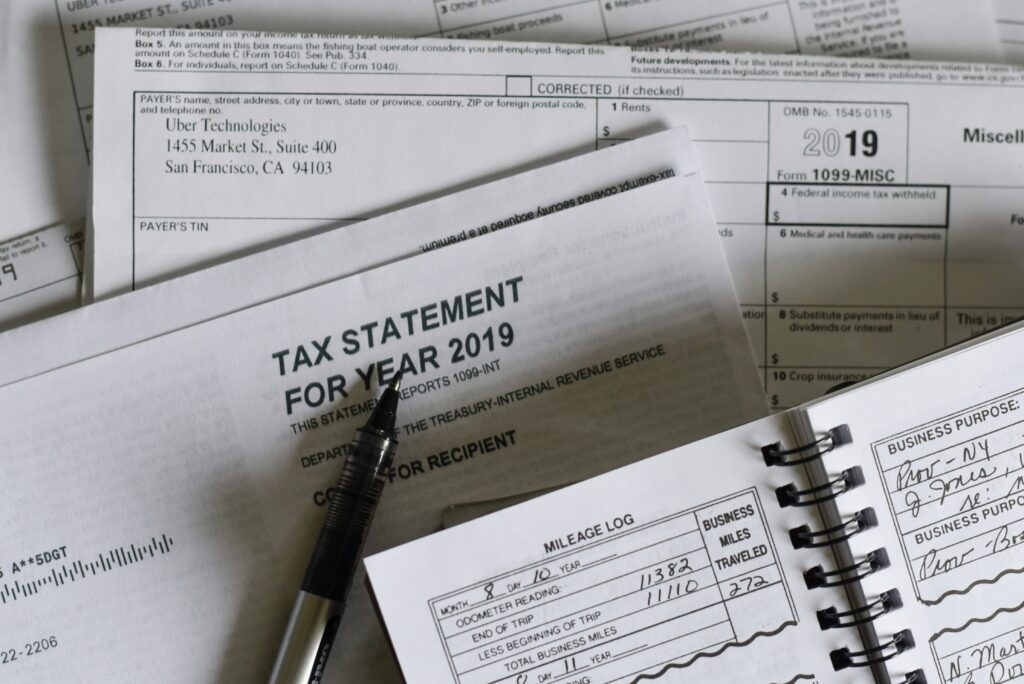Income Tax Optimization for Digital Nomads in 2025: The 4-Step System I Wish I Knew Sooner
In this article, I want to show you how you can achieve 100% legal tax freedom as a Digital Nomad, what the requirements are, and why you might be better off not listening to your tax consultant.
I’ve heard of those tax advantages Digital Nomads apparently have already five years ago. After going with this and my plan to become a full-time Digital Nomad to my tax consultant in Germany, I received a quite clear answer: “This is not possible.” – “This is super complicated.” – “This will not work.” Quite demotivated, I waited another three years until I found the right connection that showed me how much is possible and worth it.
In this article, I want to show you how you can achieve 100% legal tax freedom as a Digital Nomad, what the requirements are, and why you might be better off not listening to your tax consultant.
Big disclaimer: I’m not a tax consultant. The following is based on my experiences, the research I’ve done, and advice I got from specialists. So don’t take this as legal advice, but as motivation and education — to help you better understand the real possibilities and facts of the situation. Everything in this guide assumes full legal compliance and proper documentation of your status. Your individual situation and the specific laws in your country apply.
What means tax freedom?
All of us pay taxes. Daily and in different forms. There’s the value added tax („VAT“) we pay on every purchase, there’s the hospitality tax we pay when we sleep in a hotel, the electricity tax every time we switch on the light, the alcohol tax when we enjoy a drink in our favorite bar etc. The government comes up with many creative ways to get money from you… and of course there’s the income tax. That big damokle’s sword that hovers above us until we reach in the infamous annual tax declaration – A manuscript from hell, filled with confusion, numbers, paperwork, endless bureaucracy. We either try to decode it ourselves (and risk being corrected mercilessly by the tax office), or we hand it off to a tax consultant, someone who usually knows better anyway, but who obviously gets paid for that.
At this point I already must disappoint you: Tax freedom doesn’t mean you don’t have to pay any more taxes. In our case it should better be called income tax freedom, i.e. you don’t have to pay any more taxes on your income. Put simply: What you earn is yours. And that’s a big deal.

What it actually means in numbers and what are implications for you as Digital Nomad?
But how big is the deal really? I think none of us reading this is a multi-millionaire – most of those have probably already set up their tax free systems. You my reader, are a person that has an average to slightly above average income with an effective taxation rate of around 30% to 40%. You pay around 1500 to 2000 USD in taxes per month.
This might be little stuff to the millionaire, but for you? It’s a lot. Now I tell you, that as a Digital Nomad you can keep these extra money per month to yourself. Or in other words: You no longer work 1/3 of your year for the government. How does that sound?
And for you Digital Nomad upon your own choice this means:
- You have extra cash per month, that you can now smartly invest into yourself, your business or your loved ones
- You can work less for the same amount of money
- You can less per hour to easier get clients while receive the same cash
- You don’t get any more letters and you never have to do a tax declaration again
All in all a financial deal breaker. Fact or fiction? Ladies and gentleman, this is a true story.
What are the 4 main pillars (+ their requirements) of legal tax freedom as a Digital Nomad?
So what does it actually take to become tax-free as a Digital Nomad? First of all: You need to be a Digital Nomad, which already fulfills the first two out of four requirements.
1) You must offer a service that is 100% online.
If you’re working in Digital Marketing, you’re already on the right track. There’s no need to be physically present at your client’s office. Your service is created wherever you and your laptop are — and that’s the country you’re currently in. Which is basically the definition of being a Digital Nomad. So, you’re good on that one.
2) You do not have an active residency, status „Perpetual traveler“
In 99% of the world, income tax is based on residency. That means: you pay taxes where you are officially registered — and not just on local income, but on everything you earn globally. Which, to be fair, kind of makes sense. After all, you’re using the roads, hospitals, schools, and public services of that country.
But as a Digital Nomad, once you stop spending more than 183 days per year in one country, you can (and often must) deregister your residency there. And if you don’t register in any other country after that, you’re no longer considered a tax resident anywhere. That means outside the reach of global income taxation – legally.
Referring back to the first pillar: The service you produces is taxed in the place you reside. As you reside no where – no personal income taxation.
3) You must invoice through an international company form
Usually once you sign off you can no longer right invoices with your former freelance business or any sole proprietor form. But of course, to still receive money while being on the road, you need to do this.
That’s why you need to set up an international company structure.
The catch: that company must also not be taxable in the country where it’s formed — otherwise you’re back in the system. Luckily, there are solutions for that. The American LLC is a very good option — I’ll explain why later.
4) You need the ambition to go down the rabbit hole.
… and have a good tax consultant on your side. Because national and international tax law can get complex — fast. I did the whole process with taxhackers.io, which was a great choice. They guided me step by step and answered all my questions. And believe me — once you start down this path, there will be a lot of questions. (They offer free consultation calls)
Sounds like a lot of work? Sure, setting this up takes some initial effort. But once everything is running, it’s smooth. Maybe you’ll sign one document per year. That’s it.
And the outcome? Absolutely worth it.

How long is does the process take?
From my own example from my first contact to taxhackers to the start of my first legal tax free payment to my LLC bank account it took around 8 weeks. Your necessary de-registration takes a week, clarifying questions from the financial office maybe another week. The opening of the LLC around 3-4 weeks. This process can get longer if you still have to cancel your dwelling in your former home country, which is a requirement for official de-registration.
Busting 4 myths on legal tax freedom as a Digital Nomad
1) And what about your passport? How do you travel? You do not lose your passport. Your passport is bond to your citizenship, which is a different pair of shoes than the residency.
2) Do I lose my health care? Yes, you do lose your national health care. But you also don’t need it anymore. What you do is to get a new international health care that covers your worldwide travels. And this one is mostly cheaper and better than your old one. (I can recommend Safetywing or Passport. If you’re still registered in Germany, hit me up I have a special recommedation.)
3) Is this legal? Yes! 100% legal. We’re operating within a bulletproof legal framework. The important part is: you have to make sure you don’t (unintentionally) establish a new residency somewhere else, and that you clearly cut ties to your old one (no apartment, no registration, etc.).
4) Does this only matter for rich people? Actually, it’s the opposite. Someone earning 30k per month and saving 10k won’t feel much of a difference. But you, earning 5k and saving 2k? That’s a complete game changer. The impact on your lifestyle is way bigger.
Anything I forgot? Text me! I’m happy to clear out your doubts.
Why the LLC Set Up is probably the best one out there
When people talk about tax freedom they often think about BVI or Dubai. However, those companies are not recommended for your Digital Nomad set up, as some tax offices do not accept invoices for tax deduction. A big disadvantage for your client. The American company in most countries of the world is renowned, that’s way there will be no problems with that. Also formally a Dubai company sounds way less serious than an American one.
In contrast, the American LLC is widely recognized and respected around the world. In most countries, it’s seen as a “real” company — which means your invoices get taken seriously, your clients have no tax problems, and you instantly gain more credibility.
Also — let’s be honest — saying you’re working with a US-based company sounds a lot more professional and trustworthy than telling clients you’re invoicing from a Caribbean island or some shiny free zone.
Also, the LLC requires a low maintanance, minimal accounting and besides a single form per year, no tax fillings. The whole system behind it is also pretty straight forward and agencies like taxhackers.io help you neatly with the execution.
Special case: USA
This setup works for 99% of countries. There are two exceptions – the relevant one being the US (the other is Eritrea). The US has a citizenship-based tax system, unfortunately. That means if you’re a US citizen (which you typically are by birth), you don’t escape tax obligations so easily.
In other words: no matter where you live, you still owe taxes to the US. Drastic, I know. The only way to fully avoid this would be to give up your US passport and acquire a new one — which, of course, comes with the loss of certain privileges and is way more complicated than our Digital Nomad tax freedom approach.
That said, there are tax advantages you can benefit from if you live outside the US for at least 90% of the year and earn under $126,500 annually. I explain this in more detail inside my full online course.

Limitations of a Digital Nomad tax free set-up
So aside from the special case of the United States – are there any downsides? Like with most things in life, this setup comes with a few challenges. But in my opinion, they’re small compared to the huge financial upside. Here’s what you should be aware of:
- Things like pension entitlements, retirement schemes, or certain public subsidies often depend on a fixed legal residence. When you give that up, you also give up those benefits. That said, you can often compensate for this with the financial freedom and flexibility you gain.
- The system isn’t built for Digital Nomads—because 99.5% of people live in one place. So, for every financial transaction, you’ll usually be asked to provide a physical residential address. In many cases, you can use an address of your choice. But for things like opening bank or brokerage accounts, you’ll often need proof of residence. That’s where some creative and legal workarounds are required. I go into these in more detail in the full course.
- If you want to keep your setup clean and avoid triggering tax obligations in a particular country, you shouldn’t pay out large sums to a private bank account in your old (or any high-tax) residency.
But that’s basically it! So far I haven’t found other flaws in the system.
My personal opinion and recommendation
If you’re a Digital Nomad, not a US citizen, and you don’t plan to settle down in the next two years, then taking advantage of this legal tax freedom is an absolute no-brainer.
You’re not residing anywhere. So I personally don’t see any obligation for us Nomads to actively pay into national systems. We already contribute indirectly through things like VAT wherever we go.
For me, cutting the ties with my former home countries unlocked a whole new level of freedom. No more letters, no more tax declarations (think of the time saved!). It was honestly a huge relief – especially as an entrepreneur.
And the financial upside? I’m pretty sure you already have plans for what you’d do with that extra money.
So where do I start?
As mentioned earlier, the process of becoming tax-free as a Digital Nomad is straightforward and looks quite similar in most countries. I show it in detail in my online course. But depending on your personal situation – and especially if you’re setting up and running an international company like an LLC – I highly recommend getting expert advice. Ideally, from both a local tax consultant and from agencies that specialize in Digital Nomads.
Personally, I can recommend taxhackers.io without hesitation. They’ve been my go-to partner throughout this journey. Check out their website to get more information or you can also text me your personal question!

 Author:
Nicolas Eismann
Author:
Nicolas Eismann




